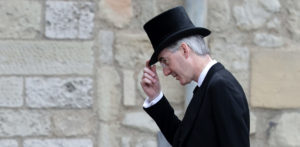An American news network rang, on 8 April 2013, to tell me that Margaret Thatcher was dead. Yes, I was happy to be interviewed. There was the usual awkward silence, long enough that I wondered whether they had forgotten me, and then I heard the words: “Thank you Dr Kissinger, now over to Richard Vinen in London.” It did not last long. By the evening, the death of Christine White — a middle-ranking Hollywood actress — was beginning to rival Thatcher’s in the American media.
British reactions to Thatcher’s death raised all sorts of questions. A Korean journalist told me that he had spent all afternoon trying to find someone who would admit to having voted for her, and came to wonder how she had won three elections. Meanwhile, the burning of effigies in mining towns seemed to me uncomfortably reminiscent of the head shavings inflicted on French women accused of “collaboration” with the Vichy government: misogynistic violence by men seeking to allay the humiliation of their own defeat. “Ding Dong the Witch is dead” was sent to the top of the British music charts: this, too, seemed simultaneously sexist and naïve. Britain was not a fairy-tale village that would live happily ever after if freed from a spell cast by one woman.
The focus on Thatcher as an individual in 2013 contrasted with the Left’s criticism of Thatcherism as a system through much of the Eighties. The term “Thatcherism” was first used, in a systematic way, by Stuart Hall in Marxism Today, in an article published in January 1979, before she had even been elected. It referred to “Thatcherism” nine times and only once to “Mrs Thatcher”. Hall, married to the eminent feminist historian Catherine, understood how personal attacks on Thatcher slid into sexist sneers. But his austerely impersonal approach was also representative of the Left’s at the time, which emphasised structures. Whereas I sometimes wonder whether my younger colleagues today are aware of anything that is not reported in the Guardian, Hall’s generation of Left-wing intellectuals were assiduous readers of the Financial Times, and always on the look-out for a “crisis of capitalism”.
Early Left-wing writers on Thatcherism were rarely sentimental about what it replaced. They had disapproved of the Heath government of the early Seventies — particularly because of its attempt to implement legislation that would have restricted trade union power. Equally, they often recognised that Thatcherism was part of broader wave of political rethinking that sometimes encompassed the leadership of both major political parties. The Labour government of Jim Callaghan, from 1976 to 1979, had been marked by both a degree of social conservatism (not for nothing was Callaghan a parliamentary representative of the Police Federation) and by a move to a more free-market kind of economics. Peter Jay — Economics Editor of The Times — was the leading British advocate of monetarism. He influenced people in both the Labour and Conservative Party, but he was himself a member of the former, and Callaghan’s son-in-law.
Now, sixth formers are ritualistically trained to write about the end of the post-war consensus; but they are rarely taught one simple fact: in the early Eighties, the fiercest attacks on consensus came from the Left. It was Labour who fought the 1983 election on a manifesto that would, among other things, have meant British withdrawal from Nato and the European Economic Community. Some on the Left had even felt a grudging admiration for the radicalism of the first Thatcher government. They shared its distaste for condescension that some citizens experienced when they dealt with powerful agencies of the state. Like Thatcher, they disliked the complacency that they associated with established politicians of both parties.
Everything changed after Labour’s crushing defeat in 1983. The challenge of Thatcherism demanded that the Labour Party ease its way back to the centre ground. The Tories, too, saw that there was not much point in ostentatious radicalism, once the major victories of the early Thatcher period had been won — particularly after the National Union of Mineworkers had been broken in 1985. They were now presiding over a new consensus, in which weaker trade unions and the sale of council houses were widely accepted. Privatisation, a word that they had barely dared use as late as 1979, was commonplace. Thatcherism had triumphed.
But Thatcher’s personal style — her flamboyant awkwardness and her obvious distaste for her political enemies — did not suit the new mood. She was never comfortable with consensus, even when the consensus in question was one that she had helped create. The personal myth of Margaret Thatcher began to diverge from Thatcherism. Earlier in the Eighties, for all her strident tone, Thatcher had been a politician, intuitively conscious that she needed to compromise and sometimes even retreat if she was to survive and achieve some measure of what she wanted. Later in the decade, she was increasingly prone to present herself as a kind of British de Gaulle — a national saviour who was above politics.
The emphasis on Thatcher as a person created problems because, as the writers behind Marxism Today had rightly sensed, Thatcherism had not really been about Thatcher. Her government had contained able and powerful ministers who pushed through different aspects of its policy. Indeed, Thatcherism was built on a kind of coalition that involved compromises and alliances between different kinds of people with different priorities. Keith Joseph was the most prominent political thinker behind the whole thing but useless at practical politics. Michael Heseltine and Peter Walker were indifferent about — in Walker’s case hostile to — some of the economic theory that underlay Thatcherism, but both men delivered spectacular practical results.
Not surprisingly, Thatcher’s emphasis on her own personal significance and her alienation from the mundane compromises of domestic politics annoyed her colleagues. (It was an alienation that was increased by the fact that she came to think of herself more and more as an international stateswoman rather than a British politician.) It helped precipitate her eviction from the leadership of her party and thus from Downing Street. Thatcher’s fall was, though, a revolution within Thatcherism rather than a revolution against Thatcherism. The economic policies of the Thatcher government continued. Indeed, in policy terms, Major was more Thatcherite than Thatcher: he privatised the railways — something that she had hesitated to do — and closed the last British coal mines.
Thatcher’s fall further divided the cult of Thatcher as an individual — let’s call this “Thatcherianism” — from the policies of Thatcherism. Thatcher had been on the Conservative front bench for most of her political career. Now for the first time she was freed from the constraints of practical politics. She became more extreme and was deeply bitter towards party leaders, especially Major, whom she believed had betrayed her. The myth of her martyrdom was cultivated by a small number of loyalists who had followed her into political exile, as well as by younger people who came into parliament too late to have direct experience of what the Thatcher governments had actually done.
“Thatcherianism” began to acquire its own political identity, separate from Thatcherism. It revived the social conservatism that had been part of Thatcherism in 1979 but had largely disappeared from the policies of the Thatcher government by 1989. Most important, it pushed a ferocious hostility to the European Union — particularly after Thatcher presented herself as the standard bearer of opposition to the Maastricht treaty in the early Nineties. This was quite a break with the past: it had been Labour that spoke of leaving the European Community in 1983. Thatcherites had welcomed West-European unity as a means of resisting Communism and promoting free markets. Thatcher was always emotionally ill-at ease with Europe but, during most of her years as prime minister, she was also realistic enough to know that emotion is a bad guide to politics. As late as 1988, she would regarded leaving the European Union as bat-shit crazy.
In an odd way, the rise of a personalised “Thatcherianism” cult played into John Major’s hands in the early Nineties. The intemperate, ungracious nature of attacks by Thatcher and her remaining allies occluded the extent to which the Major government was really continuing her economic policies. It also contributed to the sense that Major was a moderate and consensual figure — and this, in turn, helped make policies that might once have seen as highly controversial seem like a new kind of common sense. Tory frontbenchers in the Nineties managed to imply that they had moved on from the savage conflicts of the Eighties and that it would be unreasonable to hold them responsible for the policies of the Thatcher governments — governments in which many of them had served as senior ministers.
Of course, the success of Thatcherism extended beyond the Conservative Party. The truth is that large parts of the British establishment — civil servants, Labour politicians and even the occasional trade unionist, such as Frank Chapple — regarded much of what the Thatcher government did, notably breaking the miners, as necessary. There was also a more general shift in public opinion and behaviour. Dozens of small-scale actions — buying shares in privatised companies, voting for demutualisation of buildings societies (or taking the bonuses even when we voted against) — made most of the British middle class complicit in one way or another. Indeed, it is extraordinary how the free-market pervades everyday life in modern Britain. I am writing these words in Delhi. When I first came here, in 1984, the notion of haggling over money when, for example, one took a ride in an auto-rickshaw, still seemed odd. Now we are, in effect, haggling over money every time we book an Uber online.
Andrew Gamble was the single most important person to write on Thatcherism for Marxism Today. When he kindly came to speak to my students about this part of his career, he remarked on the brief commercial success of the magazine after it was stocked by W.H. Smith. The students asked whether this meant he got paid more. He grinned ruefully and said that he — and, so far as he knew, the other contributors — never even thought to ask about payment. Things have changed. A friend of mine gave a television interview after Thatcher’s death. A child of the Eighties herself and with a keen entrepreneurial instinct, she was much impressed that the leading public intellectual with whom she shared the studio negotiated ruthlessly about his appearance fee. Finally, the cameras went on and the interviewer asked what Thatcher had done to the country. The leading public intellectual paused to compose his features into an appropriately solemn expression and said: “I am afraid that she made us all much more selfish.”
Disclaimer
Some of the posts we share are controversial and we do not necessarily agree with them in the whole extend. Sometimes we agree with the content or part of it but we do not agree with the narration or language. Nevertheless we find them somehow interesting, valuable and/or informative or we share them, because we strongly believe in freedom of speech, free press and journalism. We strongly encourage you to have a critical approach to all the content, do your own research and analysis to build your own opinion.
We would be glad to have your feedback.
Source: UnHerd Read the original article here: https://unherd.com/




